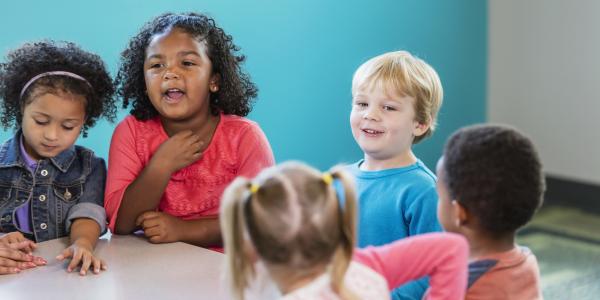Exploring the Presidential Election in One Pre-K Classroom

Editors' Note: In this blog, one educator describes how she explored concepts of fairness, perspective taking, difference, and voting during a previous election. What might an exploration of voting and an election look like in your own context or setting?
Exploring the Election in My Community of Learners
An Exploration of the Meaning and Purpose of Voting
Want to Learn More?
The following resources can help educators intentionally integrate approaches and content to address the skills, knowledge, and dispositions children need to understand what it means to be group members and active community participants.
Teaching for Equity and Agency: Intentional Strategies That Support Anti-Bias Education | NAEYC
In this article, the authors share how the Complementary Curriculum Approach can guide educators in designing, presenting, and scaffolding curriculum aligned with children’s interests to strengthen and deepen their learning experiences.
Drawing on research and their primary classroom experiences, the authors of this article describe how teachers can foster learners’ civics knowledge and skills by cocreating learning environments, making materials accessible, promoting learner agency through classroom procedures, and scaffolding approaches to problem solving.
Exploring Families’ Language Practices Through a Social Studies Inquiry in Kindergarten | NAEYC
The four authors of this article share how they integrated multilingual learners’ language practices and cultural understandings in a kindergarten social studies unit focused on families that engaged the children and their families.
In this Voices of Practitioners article, a Washington, DC-based preschool educator shares how she implemented a project focused on civic action with her class of 3-year-olds and how the children learned about what it means to be citizens.
References
Derman-Sparks, L., & J.O. Edwards, with C.M. Goins. 2020. Anti-Bias Education for Young Children and Ourselves. 2nd ed. Washington, DC: NAEYC.
Dorsey, E., N. Danner, A.L. Lewis, & M.M. Ostrosky. 2024. “Learning, Practicing, and Exhibiting Leadership: Helping Children Develop as Classroom Leaders.” Young Children 79 (1): 50−58.
NAEYC. 2020. “Developmentally Appropriate Practice.” Position statement. Washington, DC: NAEYC. NAEYC.org/resources/position-statements/dap/contents.
Norline Wild, PhD, is an assistant professor in the College of Education at Niagara University, New York. Before becoming a teacher educator, Norline was a preschool and pre-K teacher. Norline’s practice-based research focuses on the power of picture books to promote social justice. She is committed to supporting educators in creating inclusive and equitable classroom communities.